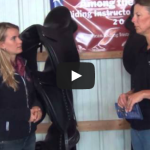No one person had done more for my riding than Angelo Telatin. I learn something new everytime I ride with him and his training is logical and sytematic – for both horses and riders.
Whenever I have the opportunity I like to film my lessons so that I can review them later and so that I can share the best moments here on the blog or within my online courses.
The video below is from my lesson with Angelo Telatin on October 29, 2015. This segment was from the beginning of the lesson as Angelo was explaining how we can improve the movement of a horse and develop self-carriage using correct training through operant conditioning.
Angelo is one of only 64 British Horse Society Fellows as well as a professor with a masters studying equine learning theory.
If you like this video and want to learn more from Angelo, sign up for Free Training from his online course, Science of Horsemanship.
Angelo will be teaching at my farm September 23-24, 2017 We still have riding spots open, plus we’ll be live-streaming the event for members of his course. Click Here for Details
See you in the comments!
Callie













29 Responses
Thank you for posting a link to Angelo’s additional video clip with Maggie. That was a very visual and clear demo of pressure and release and I am going to share it with a few friends! I am looking forward to your series with this trainer in January.
I am so frustrated with my riding. I have had two lessons back to back where my four hooved friend acted up. I rode her through it so that I didn’t reward her…..yet I also didn’t want to frustrate her out of my lack of experience. I guess I just lack the ability to feel the pressure/release at the right time. I wish I had someone like Angelo that could get that across to me. I know it works, but I haven’t figured out what I am doing wrong.
Hi Fi,
It does take time to feel correct timing when you are just learning to your ride. The best advice I can give you is to try not to get frustrated. Focus on when you do succeed – working from your success will help you make more progress than working from a frustrated place!
What stands out to me is the idea of consciously tensing and relaxing my body. Doing that and being aware of the horse at the same time and the timing of it all and the context seems like quite a challenge, but something to try. (My teacher’s “mantra,” I believe, is awareness of self, others, and surroundings).
I feel I understood better what he was saying in this video after watching the video with Maggie and then re-watching this one, as he was demonstrating with Maggie what he was explaining in this video.
Make good sense but in practice for me it is very ellusive.
Thank you for these videos. My wife and I are fairly new to horses but spend 2 2 hour sessions with are rehabing horse Red. We are taking 3-4 hunter jumper lessons a week until our boy is ready to be ridden again. He has a moderate SDFT torn in left front. Weekly increased bidaily walks now at 35 minutes each. Deep massage / Carrot stretches at each session by us with support from month visits by equine rehab lady and monthly accupuncture/Chiropractic by Eastern DVM. My hopes from your resources include getting Red rebalanced and more off his forehand as well as to improve his reluctance to bend in turns and circles. He has no problem bending to his hip for a carrot both directions. Red is a 17.1 retired Danish Warmblood trained to FEI 1 retired for 2 years and now sluggish to most aids as noted by our dressage trainer.
Thank you, thank you! This is very helpful. Sometimes you hear the same concept over and over but you hear it one more time and it clicks!
Hi Callie,
This is exactly where I am at with my horse and OUR training; asking him to take the bit and stretch his neck instead of raising his head in response to the AIDS I am giving. If I understood Angelo correctly, I could turn that into a positive response by getting him into a circle when he raises up and thereby getting him to stretch out by a change in direction? I certainly am not going to force it by continuely kicking him to get him forward. Strained my groin muscle doing that and I don’t heal as fast anymore!
Ed
Very helpful video! The one thing I most got from it: the quickness and precision with which I need to release if my horse is going to learn what I’m attempting to teach him.
I really enjoyed the video, and I understand what Angelo is saying, but I guess I need to learn how to correctly perform the pressure/release, when to use hands/legs/seat, when to let up. I know what I want the horse to look like as we are moving, and I know I need to use pressure and release, but I don’t know what to do with my body to get the horse to make the correct movement. I hope that makes sense.
Thank you for this sequence 🙂 Looking forward to January with new video course 🙂
This made so much sense , I now understand why I struggle to ride . Thank you
Wow, this was very helpful! I do not own a horse but this will definitely help on lease rides. Sense we aren’t able to jump a lease ride without the owner present or an instructor for a lesson I tend to work a lot on my Dressage rather then being perched like a hunter. So this will be helpful thanks for sharing!
Glad you enjoyed it Samantha!
This video was awesome. I’m so glad he is teaching this technique and you are willing to learn it, instead do resorting to training contraptions , tied owns, harsh bits, that will never have the same outcome and connection with your horse. It should be noted that Buck Branaman teaches this exact technique to riders, and he’s a cowboy, and it’s excellent to see him demonstrate it and then get the riders to try it. He says it doesn’t matter how you dress it up, good horsemanship is good horsemanship, but you’ll never see him wearing spandex. He has many dressage people taking his classes.
It was very interesting and learned a new thing. Thank you very much.
This is perfect!
Increasing my skill to a steady and balanced seat, is necessary for me to be effective at employing these subtle well timed shifts in my body to help communicate more clearly with the horse.
Where can I find the video clip mentioned above of Angelo riding Maggie? Thanks Callie
Hi Bex, here is the link: https://angelotelatin.lpages.co/free-training/
I get exactly what he is saying. I am working on my newest horse who knows some lower level dressage. He’s really good at seeking the bit for collection! I plan on taking dressage lessons as soon as I find a trainer in my area! Thank you for this Callie! Do I understand there is another video demonstrating with the horse?
Hi Pam, there is more available at this link: http://scienceofhorsemanship.com/
That’s very interesting. Precision seems the key. But one needs to also be aware of the pressure on the bit and the difference between contact and traction as well . There is a French master jean d’orgeix (all in French but very visual YouTube videos ). A rather unconventional technic, but he won the Olympics before training the French Olympic team. Check it out and I look forward to your comments . I don’t think the 2 approaches are incompatible, but I am not getting anywhere but a stiff neck and locked shoulders while trying to teach my horse to get on the bit through applying pressure/tension. I wish my coach were able to promote another approach.
I love the idea of having to help the horse to find what we want her to do. I also like being reminded that part of the objective is to be always trying to do less and give to the horse more. My ONLY disappointment is that Callie sat on that horses back for all of that rather then it being introduced before she got on the horse. Horses are so incredibly patient with us, why do we make them stand around for so much talking. I know some of you will say it’s good for them to just have to stand and part of me agrees they need to learn that but making them stand while we sit on them seems “rude” somehow.
Hi Chris, I can see your point here. Sometimes, discussions just come up, they aren’t planned out and that’s what happened here. Bandit was displaying signs of discomfort, so I stayed on him for this several minutes of discussion and then we resumed our ride.
I recently had a lesson that was very similar. It can be hard sometimes for a trainer to find the words that get across their idea and then hopefully we, the students, get it. My lesson was entirely walking too. I found it a little frustrating at the time because it was so slow. But that enabled me to think about the words my trainer was using and apply what she was saying. We want to hurry up and get it already but I’ve come to learn that there is no hurry up in good horsemanship, no matter how much I wish it were possible.
Thank you for sharing the video. It was very helpful for me regarding how I need to release more quickly to provide that much needed reward. Those poor school horses I ride weekly! I am so sorry for not rewarding you quicker!
My trainer has me do 2 squeezes and then a bump to keep the pony at a trot
Sometimes trying to do everything at a trop feel sloppy . Hands heels ailment.
I like to think about it like driving eventually it will smooth out.
Horses are so forgiving. Waiting for what i am sure will be a great learning weekend
Love Angelo. Saw you both in Springfield last year. Yes, I am working on the intuitive part. These last couple of weeks I have been taking off my stirrups when I’m practicing (not in my lessons!), and I notice more that she responds to the “relax” as much as the “release” — I was playing around with that just yesterday as a matter of fact, though I don’t really have a handle on anything. So I am working on that. I find that removing the stirrups brings you even closer to the horse, so the benefit isn’t just balance but also, more importantly, communication. I’ll watch this a couple more times. Thanks, Callie.